In honor of today’s coup in Mauritania, EXILED ONLINE is reprinting a War Nerd classic about a previous Mauritanian coup in 2005, one of scores of coups that this War Nerd-friendly nation has been churning out since independence.
Less is Mauritania
I‘m back from my one-issue “unpaid” suspension, although as slow as the eXile is to send me my money, calling it “unpaid” is kind of a joke. My crime was quoting the Spartans, specifically about burning down Victor Hanson’s grape vines. Hanson said somebody torched his vines after my column appeared, and Ames caved to the jerk. Thanks, eXile! Way to stand by your writers!
As if I could tell the difference between his vines and the other 2 billion vines that these dot-com winemakers are planting all through the valley! And even if I could find his pissant “farm,” does he really think I’d just drive down there and leap out of the Subaru like a John-Belushi ninja in black face paint, humming the Mission Impossible theme song while I drag a couple of ten-gallon gasoline cans over to the vines? “Take that, you evil NeoCon Pinot Noir! Die in flames, Warmonger Chardonnay!”
Hanson is one confused little Neocon. He not only hinted that I was an arsonist, he called me an anarchist.
That’s what really hurt. Me, an anarchist? Who ever heard of a fat anarchist? Everybody knows anarchists are skinny rich boys who spraypaint “A” with a circle arou
nd it on the walls of their dorms. These jerks who want anarchy should study Africa. You want anarchy, try West Africa.
Take one of my favorite coup-producing countries, Mauritania, aka “The Big Empty.” Anybody catch the latest coup in Mauritania? God, I feel like Leno on a worse-than-usual night, just asking the question. “Anybody here from Mauritania? No? Nobody?” Too bad, because for some reason coup stories from hellholes like this make me feel all warm inside, like a good vineyard arson.
Mauritania is one of those chunks of worthless African real estate that are paradise for flies and scorpions — not so great for us mammals. One of those places that are the permanent skulking-grounds of tribes that were kicked out of someplace better.
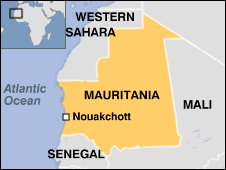
When the Berbers were pushed out of the good land in the more fertile valleys of Morocco, some fled south into the desert. When black African tribes got shoved away from the wetlands by the Senegal river, they fled north onto the sands.
And that’s the Mauritanian population today: “Moors” from the North and “black Africans” from the South in about equal numbers, hating each other, wishing they were somewhere else. Just to make it more confusing, there are “white” Moors and “black” Moors. The black Moors used to be kept as slaves by the whites, but that only makes them even snobbier about their Moorishness. They have a real Moor-ier than thou attitude and go around sneering at the black non-Moors. Snobby slaves — there’s a lot of that going around.
Nobody lives in Mauritania by choice, unless you count scorpions–which is why there were only 1.5 million people in this 1 million square km country (three times the size of Arizona) at independence in 1960.
That population has doubled now to 3 million people, in spite of the fact that 90% of the arable land has turned into desert. Not to mention the fact that all those busy Taiwanese fishing trawlers have scooped up every last sand eel from Mauritanian waters. Like that old America song says, the ocean is a desert too — at least in Mauritania.
It’s a typical African pattern: the less livable the place is, the faster people breed. Which reminds me, I’ve got a question for you Russians: Russia has about the lowest birthrate in the world, and everybody says it’s because life is so hard there. So how do you explain places like Mauritania, where life is much worse and the birthrate is zooming?
There’s another pattern in Mauritania that’s typical of Africa: the countryside has emptied and the cities are overflowing with surplus people. Nobody lives the old nomad life here any more. All the kids hang around the cities practicing their dance moves and watching old kung fu movies. They’re one of the key ingredients for your classic African coups: lots of what Ali G. would call da Yout’, scuffing around bored just waiting for a couple of jeeps to roar by waving a revolutionary flag. A little action! Sure beats watching the termite mounds grow.
For some reason, it cheers me up thinking about places like Mauritania. Maybe because Mauritania is what Fresno will look like a hundred years from now. I’ll be safely dead — the good side of being fat with kidney problems — but all the jocks who messed with me in high school, well, those poor healthy suckers will have to watch the long slide down, watch your grandkids become the goatherds of the 22nd century. I can see it now, tribes of sunburnt feral Anglos wandering around the ruins of Fresno landmarks like Wild Water Adventures, begging Soylent Green packets from the Chinese do-gooders. They’ll try hard not to pity you, try to be “understanding” when they visit your campground in the ruins of the giant waterslide park, but they’ll hold their hi-tech handkerchiefs to their noses — there’s nothing like the smell of goats in close quarters. They’ll barely be able to keep from puking while they listen to your stories about how Fresno used to be a big deal, all lit up, swimming pools everywhere.
Mauritania is full of stories like that, about its glorious past. This was the home base of the Almoravids, the Taliban of the 11th century. Real fun-loving fundamentalist Muslims, the kind who go crazy at the thought that somebody might be playing music, drawing pictures, drinking wine or otherwise offending Allah. Allah’s a funny guy: he’s down with all kinds of rough stuff — torture, slavery — but he can’t stand music.
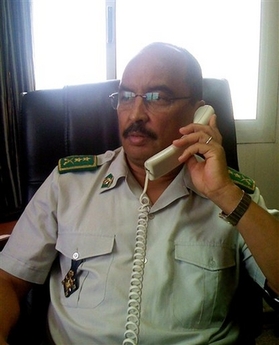
“HELLO, I’D LIKE TO ORDER A MAURITANIAN COUP WITH EXTRA SAND, PLEASE.”
Like the Taliban, the Almoravids came out of nowhere (the Mauritanian desert) and won it all: they rampaged against backsliders from Ghana to Morocco and even stomped the uppity Christians in Spain. When they were through, no Spaniard could ever make music again — which explains the Iglesias family, father and son.
Of course, slavery’s outlawed in Mauritania. In fact, according to one account I read, “Slavery has been outlawed several times.” I guess you just can’t outlaw slavery too often. It makes the Westerners happy, and of course it never trickles down to the actual slaves.
You might as well try to bring back the 55mph limit on I-5. Slaves are just about the only natural resource this landscape produces; outlaw them and the Mauritanian economy would grind to a halt.
The real point of outlawing slavery early and often is that it keeps the Western aid flowing. Those guilt-ridden rich countries give every man, woman and child in Mauritania about $170 per year. Not that it actually reaches those poor peasants. It stays in the pockets of the airport managers and government ministers, where it belongs.
So Mauritania is a perfect little laboratory of the hell that is Africa. And that’s how you have to understand the coup that just happened there — as a sample of what’s happening across the Sahel in those half-Arab, half-black countries that have a surplus of births and locusts, and a shortage of everything else.
The French held Mauritania until 1960, but their attitude was nicely summed up in an order from their colonial administration: “Let us not hear from you.”
That was all they asked of Mauritania. That was all anybody wanted from the place.
Mauritania stayed quiet until the 1970s, when Moktar al-Daddah, its president-for-life, stupidly got involved in the war between Morocco and the POLISARIO guerrillas fighting for an independent Spanish Sahara (covered in my column “Spain vs. Morocco: The Muppets Do Iwo Jima” eXile #146). These guerrillas pioneered the use of the “technical” — a Toyota pickup with a bed-mounted heavy machinegun — as the MBT of low-cost desert wars. They really scooted around the Sahara in those things. Thanks to safe havens and logistical support from Algeria, they could hit outposts anywhere in the Western Sahara.
In fact, POLISARIO columns managed to attack Nouakchott, the capital of Mauritania. When you consider that Nouakchott is on the coast, and more than 200 miles from the border, you can see why the Mauritanian officer corps was embarrassed; embarrassed enough to stage a coup in 1977. One minute Mauritania was singing “My Heart Belongs to Daddah” and the next, Daddah didn’t even have visiting rights.
The coups kept coming. In 1984 Mauritania’s officer corps decided it was time for a new face on the national currency and installed a guy named Taya, who did pretty well, slapping down a handful of counter-coups and even winning a few elections. Then Taya did the one thing no ruler in a little backwater should ever do: he got involved in the big boys’ games. Though to be fair it wasn’t totally his fault. He just got caught in the gears as the big Islam vs. the West war started cranking up.
By the 1990s, Islamists were starting to act up even in a sleepy place like Mauritania. These guys are good at PR. They pass their tapes hand-to-hand, until even those unemployed surplus kids leaning on termite mounds in Nouakchott can hear some Saudi preacher tell them to get off their duffs and go start a jihad in the neighborhood. Next thing you know, your local goof-off is a Jihadi, getting props like crazy and calling himself Abu Semtex.
Taya, the President, was sick and tired of getting noise from these brats. After all, he’d proven his right to govern twice over: first with the traditional coup and then with one of those goddamn Western-style “elections.” What more could they want?
So in the great Mauritanian tradition he joined the wrong side of the big war, using that dumb old proverb, “The enemy of my enemy is my friend.” You know, if there’s a stupider saying in the world I’d like to know what it is. The enemy of your enemy is NOT usually your friend. The enemy of your enemy is usually also your enemy. Duh!
But Taya figured, if these local Islamists are my enemy, and if their enemy is Israel and the US, then all I have to do is sign up with those guys and together we’ll squash the Jihadis.
What he didn’t take into account is local advantage. Your gang may be ten times the size of the other gang, but if you’re backed into an alley with a dozen of their guys coming at you, that advantage won’t help you much.
By the time Taya figured this out, it was too late for him. In 1999, he made the mistake of formally opening diplomatic ties with Israel. Mauritania was one of only three Arab countries to do this, and by far the weakest of the three. It was suicide for his regime. Every Muezzin in the country was on their air next morning denouncing him as a traitor to Allah. After 2001 he signed on to the War on Terror, admitting U.S. troops to Mauritania to help train local forces.
What he didn’t get was that Mauritania was never going to be a priority for the U.S. We were glad to get Mauritania’s endorsement — it went right up there on the wall next to the pledges of alliance from Togo, Panama and Kyrgyzstan — but there wasn’t much we could do to prop up Taya’s regime short of sending in troops. And nobody’s ever cared enough about the place to do that.
So Taya was in deep trouble, way out on a limb with the West but not getting any real help from it. And the coup attempts came faster than ever. In 2003 a military coup attempt ended with Taya still in power, but only after committing all his loyal soldiers to heavy fighting in the capital. There were two more attempted coups in 2004. Taya stomped them, barely. He was hanging tough until…
Well, I’ll let you take a guess. When does the smart up-and-coming African officer stage a coup? If you’re a real fan of the game, you know the answer: when the leader is out of the country. So in a way, it was the death of King Fahd of Saudi Arabia on August 1, 2005 that doomed Taya’s regime. Taya owed the Saudis big-time for decades of foreign aid, and he had to go to the funeral. So Colonel Vall, Mauritania’s Coup Plotter #1, waited until he saw Taya’s jet sailing off toward Riyadh and declared himself the new leader. It was easy. No casualties, no riots. By all accounts the people were glad of it. They never did get why their country would be cozying up to the West anyway. “Allahu Akbar” is about as advanced as politics gets in these parts of the world.
Taya did better than a lot of ex-dictators, in that he’s still alive and in possession of his toenails and genitalia. He’s relaxing in Qatar, a U.S. protectorate on the Gulf. It’s generally a safe place, though there’s a dead Chechen leader named Yandarbiyev who might beg to differ. He was killed by Russian agents in Qatar in 2004.
But Taya doesn’t really have to worry. The Chechnya war is high-stakes, high-risk. Mauritania isn’t that important to anybody. Nobody’s going to follow Taya to Qatar. They couldn’t scare up the air fare.
The new regime has released 21 Islamic radicals jailed by Taya’s government. They’ll probably reward their benefactors in the usual way: by staging a coup of their own and hanging the guys who let them out of prison.
But what we’re seeing now is a little feud between different factions of the “Moors,” the Arab/Berber ethnic group. The real trouble for Mauritania is going to come from the blacks down south who are getting sick of the northern whiteys telling them what to do.
Then there’s Niger, just to the east. Believe it or not, Niger makes Mauritania look like La Jolla. At least Mauritania’s got coastal real estate, even if there ain’t no more fish in the sea.
What you really see when you look hard at places like Mauritania is how pitiful these countries’ borders really are. What’s happening here is what’s happening all across the Sahel: North vs. South, Arab vs. “black,” Islam vs. Western. And all of it is bubbling up against a background of rapid desertification plus rising birthrate. In other words, accelerated catastrophe from now until something really big comes.es along to make us forget all the little blips on the historical graph.
This article first appeared in The eXile on September 25, 2005. Gary Brecher is the author of the War Nerd. Send your comments to brecher@exiledonline.com.
Click the pic, buy the book!
Read more: coups, Mauritania, the war nerd, war, Gary Brecher, eXile Classic, The War Nerd


Got something to say to us? Then send us a letter.
Want us to stick around? Donate to The eXiled.
Twitter twerps can follow us at twitter.com/exiledonline




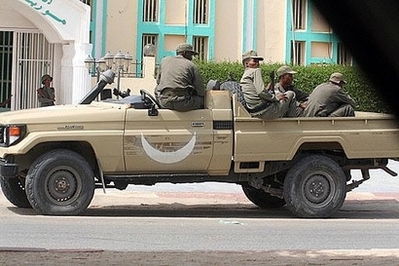
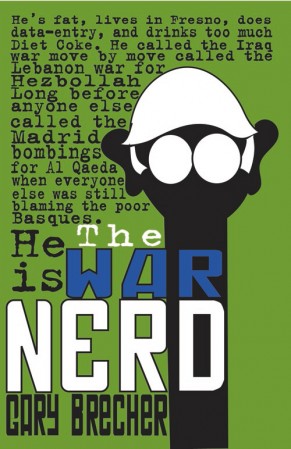

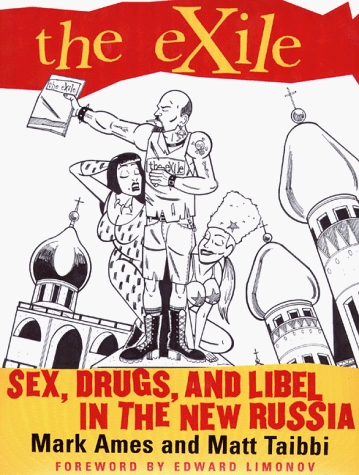








Trackback this post